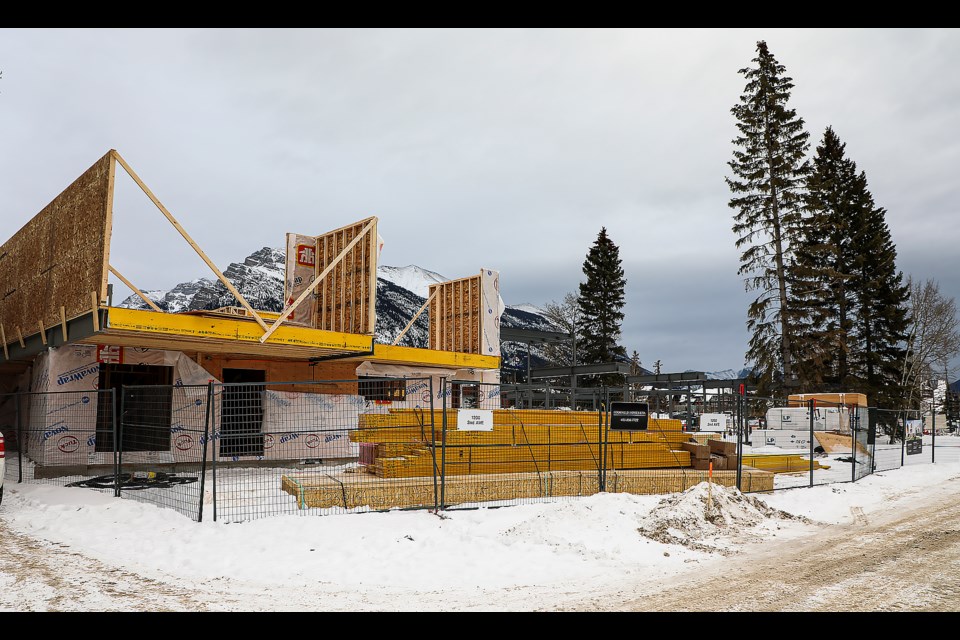CANMORE – A new building permit bylaw has been approved, giving a refreshed look to the bylaw following its last major revision almost 15 years ago.
While remaining relatively the same, the updated bylaw overhauls and introduces some new regulations, aligns with industry practices and puts a cap on permit extensions that led to a rewrite as opposed to an amendment.
One of the more notable changes is permit extensions only being given out once, whereas past practice allowed multiple extensions of either six or 12 months.
Marcus Henry, a supervisor in the Town’s planning and development department, told council some applicants receiving multiple extensions caused projects to be built under old building codes.
“We want to see them finish on time and we don’t want to see them lingering in our system,” he said. “It’ll also reduce the amount of administration processing for all the extensions we give throughout the year.”
A staff report to council stated the aim is to have projects be completed on time “which has historically been a problem” and has led to some building permits being open for years, with construction at times not following the most modern building code.
Lauren Miller, the Town’s manager of planning and development, said at times there had been up to 40 building permits that were two years or older and Town staff had been working through the summer to whittle the number down.
As of Dec. 6, she said there were six building permits over two years old.
“It became a priority for us to close them because there had been a number of file managers and it had changed hands a number of times, so it was starting to lose track of where was this application in the process,” she said. “We have now instituted a system that permits hopefully move through the system in two years, but these proposed amendments will help us fortify that process and applications are moving forward.”
Coun. Joanna McCallum praised the change, noting she has fielded numerous calls from residents asking about projects that never seem to develop during her time on council.
“This is a great update to make sure our building stock aligns with the most recent building and fire code,” she said.
Under the new bylaw, existing projects will be grandfathered and the master fee schedule will be updated Jan. 1, 2023.
The changes will also see individual buildings in a multi-building project receive permits compared to the past when an entire project would be under one permit.
Henry gave the example of Canmore Crossing, which has three mixed-use buildings, which would have been under one permit. It led to permits remaining open for several years and buildings developed under old code standards.
The change will see each individual building have its own building permit with the intent of wrapping up each permit more quickly.
“It’s not a one-sided change. It’s something all sides have to deal with,” Henry said, with both developers and Town staff having to work with the new bylaw.
A letter from Bow Valley Buildings and Developers Association (BOWDA) executive director Ian O’Donnell – which had eight developers examine the bylaw – expressed 34 concerns or points of clarification in the bylaw.
O’Donnell said BOWDA struck a committee to get a variety of input from developers in the community and said the organization appreciated the Town was open to feedback.
“It’s a very transparent and constructive relationship between private and public sector," he said. "There was good alignment with the Town of Canmore and BOWDA and its members to be able to provide feedback in a timely manner and really balance some of the aspirations of the Town and balance those with code requirements."
O’Donnell said the industry was happy to see documents and policies updated, which allows for existing challenges faced by the sector to be addressed.
“It’s very complex and something we’ve been following for some time,” he said of the changes for the building permit bylaw. “We knew it was coming and we wanted to make sure we had an appropriate amount of time for feedback and consideration of various pieces, but also for the Town to review them and incorporate, modify or provide a response as to why some may not have been accepted.”
BOWDA requested no building permit requirement if the construction value for a project was less than $8,000-$10,000 in order to reflect inflation and soaring construction costs, noting the existing limit of $5,000 was put in place nearly 20 years ago. The Town of Banff recently updated its building permit bylaw, with council approving a $10,000 limit.
Concerns were also raised about potentially restarting the building permit process for unforeseen delays such as COVID-19 pandemic-related reasons.
According to the Town of Canmore, there have been 68 non-residential building permits and 172 residential building permits issued in 2022. For non-residential, that value is $39.9 million and residential is $72.2 million.
As of Dec. 6, the application review time for a low-density residential building permit is 69 days and medium- to high-density residential is 101 days.




